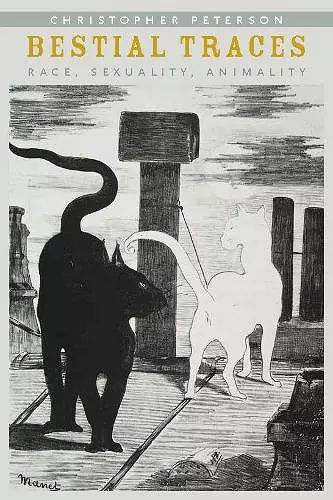Bestial Traces
Race, Sexuality, Animality
Format:Paperback
Publisher:Fordham University Press
Published:12th Dec '12
Currently unavailable, and unfortunately no date known when it will be back
This paperback is available in another edition too:
- Hardback£62.00(9780823245208)

Explores the relationship between race, sexuality, and animality in literature and philosophy.
On February 18th, 2009, Sean Delonas published a controversial cartoon in the New York Post depicting two policemen shooting and killing a monkey with the caption: “They’ll have to find someone else to write the next stimulus bill.” On the adjoining page was a photo of President Barack Obama signing this very piece of legislation into law. Although public debate over the cartoon has centered entirely on its potentially racist overtones, we might ask from a Darwinian perspective how the stereotype of the black ape works to disavow a universally shared human apehood. How might we comprehend animality in non-pejorative terms?
Whereas in contemporary race and sexuality studies the topic of animality emerges almost exclusively in order to index the dehumanization that makes discrimination possible, Bestial Traces argues that a more fundamental disavowal of human animality conditions the bestialization of racial and sexual minorities. Hence, when conservative politicians such as Senator Rick Santorum equate homosexuality with bestiality, they betray an anxious effort to deny the animality inherent in all sexuality.
Focusing on literary texts by Edgar Allan Poe, Joel Chandler Harris, Richard Wright, Philip Roth, and J.M. Coetzee, together with philosophical texts by Derrida, Heidegger, Agamben, Freud, and Nietzsche, Peterson maintains that the representation of social and political others as animals can be mitigated but never finally abolished. Insofar as humanizing the abject only vacates the structurally empty and infinitely transposable position of “the animal,” he argues that all forms of belonging—no matter how open and hospitable they are toward others—inevitably produce “beasts” whose exclusion contradicts our apparent desire for nonviolence. While one might argue that absolute political equality and inclusion remain desirable—even if ultimately unattainable—ideals, Bestial Traces shows that by maintaining such principles we exacerbate rather than ameliorate violence precisely by failing to confront how discrimination and exclusion condition all social relations.
Bestial Traces is a brave book! Arguing that our sentiments on animals are unavoidably implicated in politically contentious notions of race and sexuality, Peterson examines this entangled relation in Poe, Wright, Roth, and Coetzee. Insisting that the “irrational phantasm” of race cannot simply be thought away or eradicated in an act of pure disavowal, he seeks to exploit a 'lesser disavowal' to deconstruct racist and metaphysical conventions that imbricate animals and race. Peterson’s analysis is sure and sharply honed, his chapters theoretically sophisticated, and his reading of literary texts is finely nuanced. This is an ethical book that searches for less violent relations with others and it makes a superb contribution to our discourses on race, sexuality, and animals, as well as to 19th and 20th century American studies.---—Russell Samolsky, University of California, Santa Barbara
“Masterfully researched, creatively argued, and beautifully written.”---—Akria Mizuta Lippit, University of Southern California
ISBN: 9780823245215
Dimensions: unknown
Weight: unknown
208 pages